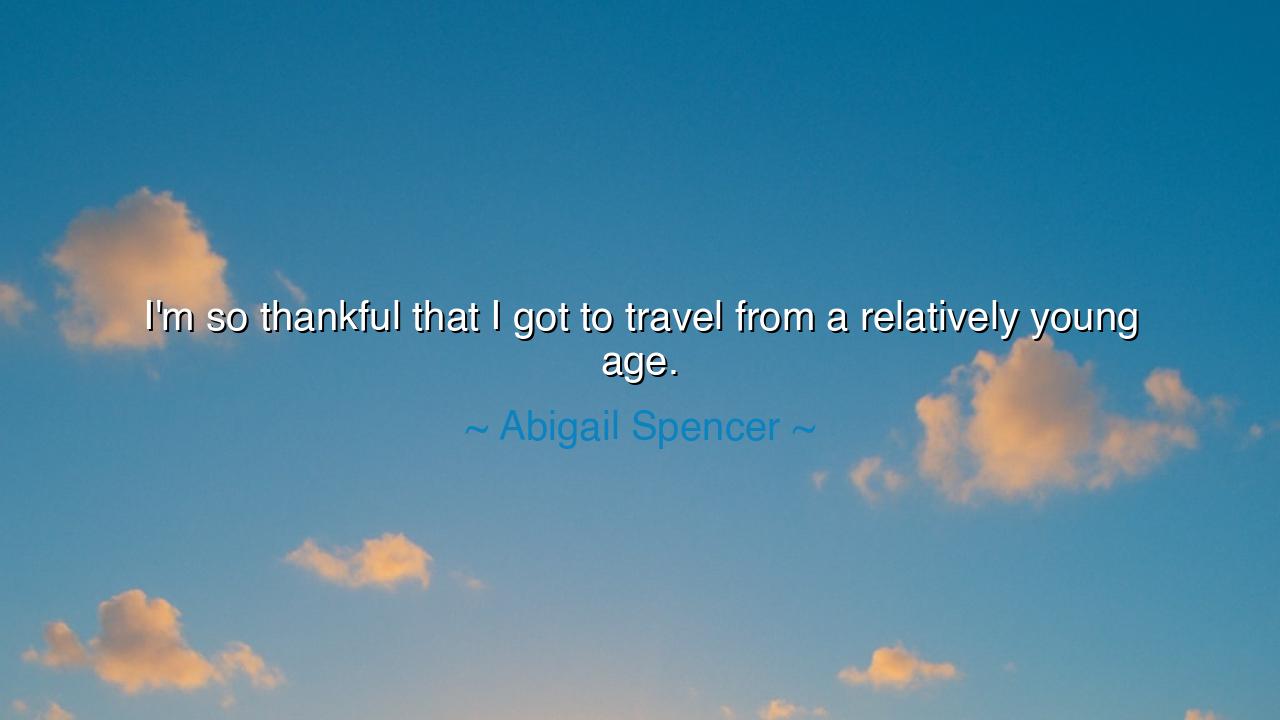
I'm so thankful that I got to travel from a relatively young






The words of Abigail Spencer are filled with gratitude and remembrance: “I’m so thankful that I got to travel from a relatively young age.” At first, they may appear simple, but in truth they reveal an ancient truth about the shaping power of movement, of journeying beyond the familiar, of leaving the narrow confines of one’s birthplace to embrace the vastness of the world. To travel is not merely to change one’s location, but to expand one’s mind, to stretch one’s soul, and to awaken the heart to wonders it never imagined.
To be thankful for travel in youth is to acknowledge the gifts that come from exposure to difference and diversity. When the eyes of the young see new lands, new customs, new ways of life, they are freed from the illusion that their own small world is the center of all things. The traveler learns humility before the enormity of creation and discovers kinship with peoples far removed from their own. Abigail Spencer, in her gratitude, teaches us that such journeys are not luxuries but formative experiences, seeds that grow into wisdom and empathy.
The ancients knew well the transformative power of travel. Consider Odysseus, who journeyed for years across seas and through trials, and who returned not only a survivor, but a man filled with knowledge of many peoples and lands. Or recall Herodotus, the “father of history,” whose travels across nations gave him the vision to weave together the stories of entire civilizations. Even the young Alexander was taken by his teacher Aristotle to see foreign lands, to study their laws and customs, so that when he ruled, he would not be blind to the diversity of mankind. In every age, those who traveled young returned with hearts and minds enlarged.
Spencer’s gratitude is also a reminder that travel is more than external—it is inward as well. Each journey outward is also a journey within, forcing one to confront fear, to endure uncertainty, to adapt to change. The young traveler learns resilience and independence, lessons that no classroom can truly teach. Thus, to travel early is to be forged early, to gain wisdom not in theory but in practice, with one’s own feet walking unfamiliar roads and one’s own eyes beholding the unknown.
Her use of the words “I’m so thankful” reveals the humility of one who recognizes that not all are granted such chances. Many live and die within the boundaries of their birthplace, never knowing the vastness of the earth or the richness of its people. To be given the gift of travel is therefore not a right, but a blessing—and to recognize it as such ensures that the gift is not wasted. Gratitude transforms memory into wisdom and prevents privilege from souring into entitlement.
The lesson here is clear: seek out travel not as indulgence but as education. Let each journey expand your understanding, soften your judgments, and strengthen your spirit. And if you are granted such opportunities in youth, do not squander them—use them to build a foundation of openness, humility, and courage. For the world is a vast teacher, and its lessons are written not only in books but in mountains, seas, and the faces of strangers.
Therefore, let us act with Spencer’s spirit. If we can travel, let us do so with reverence and gratitude, not merely as tourists but as learners. If we cannot, let us still travel in spirit—through study, through stories, through conversations with those unlike ourselves. And above all, let us be thankful for every chance we have to step beyond the borders of familiarity, for each step outward is also a step inward, shaping us into wiser, kinder, fuller human beings. In this way, the wisdom of Abigail Spencer becomes clear: travel in youth is not just movement across space—it is the beginning of a lifelong journey toward understanding.






AAdministratorAdministrator
Welcome, honored guests. Please leave a comment, we will respond soon